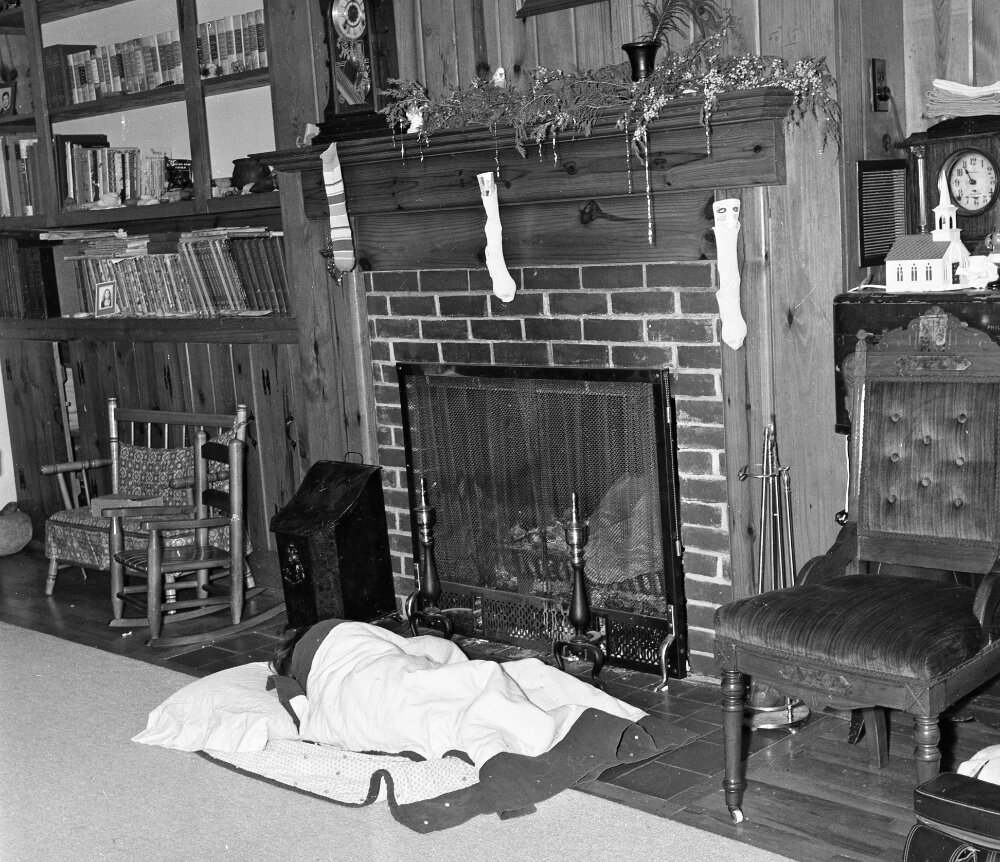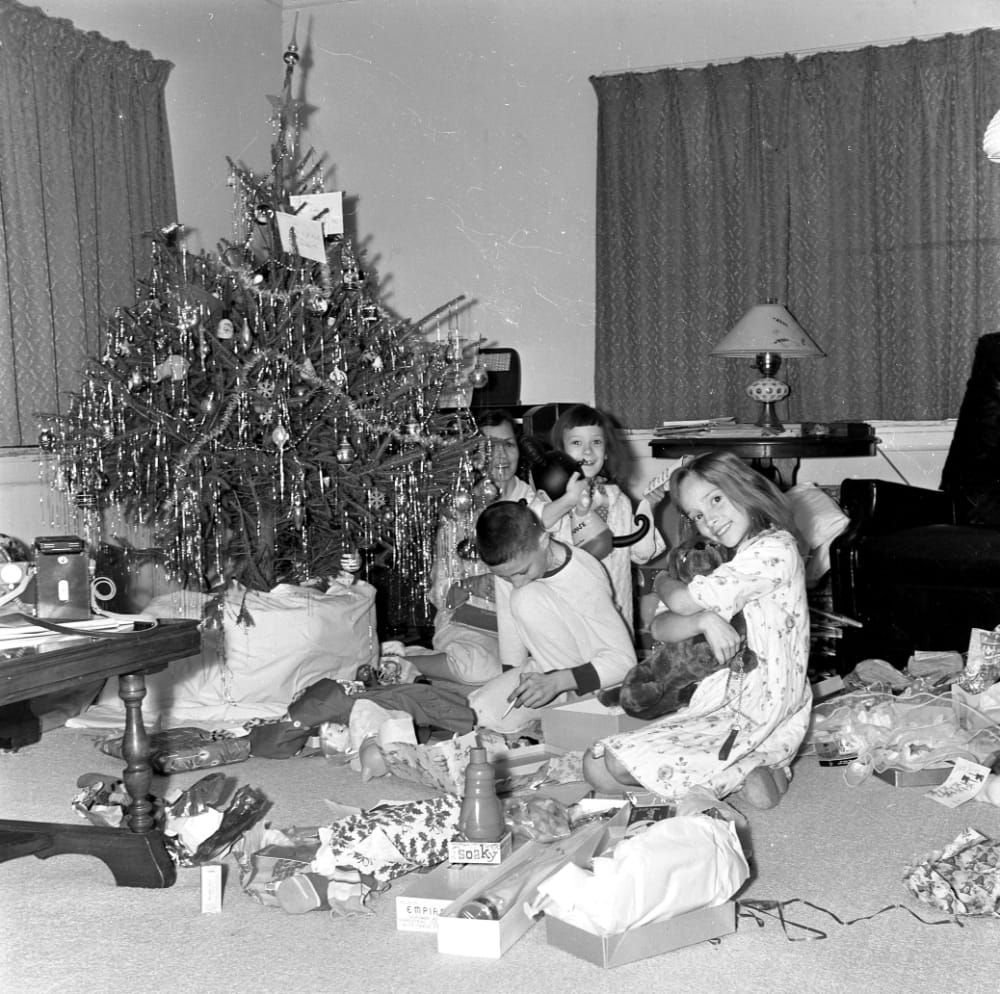
So. We’re three days from Christmas.
These last couple of years the holiday, like everything else, has gotten a bit deflated as two presidents and a lot of medical bureaucrats, liking the feel of unexpected power, have succumbed to the irresistible compulsion to do something, whether it was advisable or not.
The effects were troubling to some people more than they were to me, because for a number of years now I’ve enjoyed low-key Christmas celebrations. This is in part due to my having given it more thought, particularly as to the origins and our practice surrounding the holiday. It is an important holiday, certainly, and it is the leading holiday in the Church of Retail, but I recoil when I hear the professional hairdo models who read television news describe it as the holiest day in Christianity, which it isn’t. The holiest day in Christianity is Easter, as the situation at the end of a football game is what matters, not the kickoff.
I grew up high-church Episcopalian. There was a sense of awe and reverence and beauty in liturgical worship — none of us spent any time worrying that the denomination was invented so that Henry VIII could get a divorce, nor did that figure in our petitions to and praise of God, which I hope were effective despite the church’s heretical origin. Over time, the awe and reverence and beauty departed, as did most of the congregation, including me. (It is a source of daily anguish to me that the current occupant of the papal throne seems bent on doing much the same thing to Roman Catholicism, to which I fled years ago.)
The final straw outside the manger, as far as I was concerned, came to me when I heard an Episcopal priest say — this was not official dogma, but still — that his interpretation of the virgin birth was that “Joseph was really gullible.” Last I heard, that priest was working as a massage therapist. Really.
But it was not always thus.
When I was a little kid, as Christmas drew closer activities were more and more connected with church. On Christmas Eve, there was a children’s service. Each child would bring a canned item, wrapped in white paper, and at one point in the service we would bring these forward and put them in a basket at the foot of the creche. They would be distributed to the town’s poor.
Getting to sleep Christmas Eve was almost impossible, unless one adopted the trick known to every Catholic and Episcopalian child: Go to Midnight Mass. This was not the town in Massachusetts where witches were hanged, but a church service, one of the most beautiful of the year. It was magical and deep, and required that the priest have very good timing, for precisely at midnight, no matter where we were in the service, a wonderful thing happened. Col. Troxell, a tall, dignified man with a gray moustache who received his rank as one of Gen. Pershing’s horse soldiers in World War I, pulled the rope and the bells would begin to peal. As a body, the congregation would jump to its feet, and the delightful, flamboyant organist, Heinz Arnold, would, literally, pull out all the stops as “Joy to the World” was sung with such enthusiasm as almost to explode the church. If God resides in a house of worship, it was at that moment that He was home and accepting visitors.
The valuable by-product of all this was that it would be very late when we got home, and sleep came easily.
The Christmas morning ritual was divine torture.

My parents awakened, as always, before we did, though on Christmas Day everyone slept later than usual — sometimes my sisters and I didn’t get up until 8 a.m. In the early years, when we slept downstairs, it was easy to usher us to the dining room; later, when we had our own rooms, we had to promise not to look as we came down the stairs, through the living room, and into the dining room. For the double doorway between the dining room and the living room was covered by a curtain made of an old white bedspread. The ritual was that there would be no Christmas presents until after everyone had eaten a good breakfast and, in my case, until such animals as required attention received it.
And it was always a wonderful breakfast, though it was wasted on three children eager for things other than nutrition. There were eggs and sausage and bacon, pancakes and English muffins and marmalade and home-made grape jelly, milk and orange juice and tomato juice and coffee, for the adults, brewed in a percolator instead of the usual instant stuff. The house smelled wonderful.
My grandparents were invited for breakfast, and they were not ones to rush, either in getting to our house or in eating once they got there. My grandfather did not speed up for anyone. He was methodical and set his own pace. He was regularly stopped by the police for driving too slowly. Enjoying Christmas breakfast, as far as he was concerned, required that it be approached in a leisurely fashion. My sisters and I would have denied him this, though in retrospection it added much to the atmosphere of anticipation. They all took so long in drinking that last cup of coffee, and they chatted freely, as if they did not realize that it was Christmas and they were surrounded by children in distress.
Finally the great moment came, when breakfast was done and the dishes had been cleared away — at least we weren’t required to wash them just now (and truth is, it was my mom who would do it, anyway — it’s hard to be a mother); perhaps the idea of a full-fledged Christmas morning mutiny was more than my parents and grandparents could bear — and my grandparents were near the doorway to the living room and all was ready. With a great and theatrical flourish, my father would sweep aside the curtain-nee-bedspread, and in we would rush. The first glimpse of the spectacle revealed a room greatly altered from the night before. Our stockings, hung on the mantle the night before, now bulged with nuts and candies and, protruding bulbously at the toe, those awful oranges. But it was the area around the tree that was most striking. Sometimes there was an item that couldn’t be wrapped, such as Janie’s sewing chest, but mostly there were colorfully wrapped boxes and shapes of every kind where yesterday there had been nothing. The wrapping paper was often familiar, because it was saved and used year after year, with new additions recruited each year and the worn-out scraps retired. It was a memorable sight — too bad that the three children there were intent on reducing it to rubble as soon as possible. My mother and father would position themselves near the bottom of the tree, with the three of us spread out fan-fashion around them and my grandparents seated on the couch or in the rocking chairs that were abundant in our living room. Packages would be handed out, one at a time; at first, the idea was that we would all watch each present as it was opened, but this idea was quick in falling apart, and in a few minutes, each person would be busy unwrapping something. Janie, Emilie, and I would at one point or another be torn between playing with the treasure we had just unwrapped or putting it down and opening another one. It was great.
After awhile, all the packages were unwrapped and, in the unwrapping had grown to two or three times their previous size; there were empty boxes all over the place, and wrapping paper. My mother would get up and go to the oven to inspect whatever she was preparing for Christmas dinner, which would be held at my grandparents’ house and would be would be attended by such aunts and uncles and cousins and second-cousins and cousins-once-removed — 20 people or so in all — as were living in the vicinity. My grandparents would make their way home, to be joined an hour or so later by us. We would play for awhile, then get ready and go next door.

There were a few times when my father’s wishes prevailed (my grandmother in enthusiastic agreement) and Christmas dinner was centered around a roast goose. I don’t care if it’s traditional. I don’t care if it is required. A goose is a terrible thing to eat on Christmas or, in my opinion, at any other time. The only proper Christmas Dinner is turkey. Turkey tastes good. Even when there was goose, there were mashed potatoes (though goose gravy is awful and turkey gravy is wonderful — but you get the idea), relish plates on crockery seen only at Christmas dinner, my Aunt Oma’s delectable asparagus casserole, various vegetables, and pie for dessert. There were cousins to play with and to discuss our Christmas booty with and to dash around the basement with until we were sweaty and tired and cranky.
Nightfall came early and with it a melancholy just a hair this side of gloom. Christmas was, for all intents and purposes, over; the scene was not unlike a deserted street after the parade has passed. All that was left to do was clean up.
I’ve always thought it a bit of a tragedy, the shock that comes when Christmas is over. Sure, for us there were still toys to play with and at least 10 more days free of school, but the Christmas season is a little like sliding down a ski jump ramp without skis: Very exhilarating, very exciting, going faster and faster and getting higher and higher toward the end, and then, kerplop!, right into a perfectly ordinary winter day. The Christmas music on the radio builds during the buildup to Christmas. I think it ought to taper off, a little, after Christmas.
The final part of our Christmas tradition was that the tree would remain in the living room until New Year’s Day. On New Year’s afternoon, it would be carefully undecorated. The popcorn and cranberries were taken outside and left on trees for birds to peck at; the tinsel, some of which was the thin tin stuff from many years before, was removed as carefully as it could be, and repackaged; the ornaments, minus the one or two that had gotten broken, were put in their boxes, as were the creche and its occupants. The lights were unstrung, first from the tree and then from the gutters outside, and carefully packed away, to await the gremlin that would, sometime in the next 50 weeks, break the filament on one of the bulbs, rendering the entire string unusable until the troublemaker was located and replaced a week before Christmas next year. Then the scene was kind of bleak.
Because after Christmas comes January, then February.
And Easter seemed, then as now, very far away.

Dennis E. Powell is crackpot-at-large at Open for Business. Powell was a reporter in New York and elsewhere before moving to Ohio, where he has (mostly) recovered. You can reach him at dep@drippingwithirony.com.
You need to be logged in if you wish to comment on this article. Sign in or sign up here.
Start the Conversation